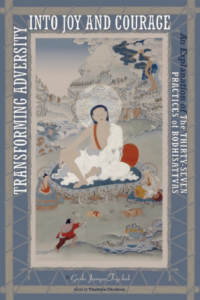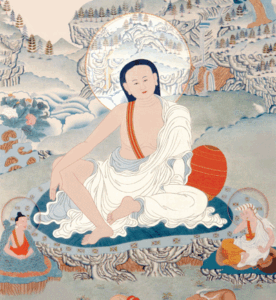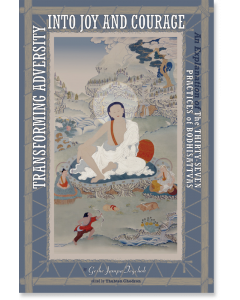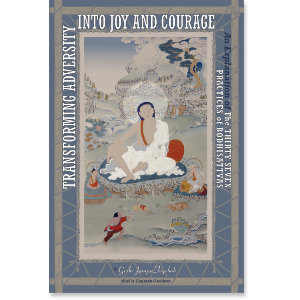 Analytical meditation
Analytical meditation
How do we know that we have gained the intended result from a given meditation? How much time should we spend on each meditation? How do we prevent the experiences we gain from deteriorating? We shall then cover the general points regarding this now, and points related to specific meditation topics will be dealt with as they arise in the root text. Analytical meditation was briefly mentioned above. We shall spend some time explaining it, since it is vital for us to understand.
Although we have heard many teachings and may be enthusiastic to teach them to others, our mind is not subdued and our qualities are not developed. What is the difficulty? We have not gained experience from meditation and have not integrated our knowledge into our experience. In other words, we know a lot, but have not meditated on it properly. Merely knowing the teachings does not constitute analytical meditation. This does not produce the internal transformation that analytical meditation does. Analytical meditation is real meditation, important meditation. It is indispensable for generating realizations.
Occasionally, strong determination to be free from cyclic existence or strong faith in the Three Jewels may arise without having meditated a lot. This is not analytical meditation. From time to time we might think, “Cyclic existence is awful. I’m off to a cave in the mountains to meditate.” Or we may suddenly have a strong feeling of love for all sentient beings, but then it vanishes and we feel as we did before. Sometimes we may have a sense of the emptiness of inherent existence and think, “Now I’ve realized emptiness. This is fantastic!” But then the experience fades away and we think, “Oh no, I’ve lost the realization!” That also is not an experience arising from analytical meditation. What are these experiences then? They are a form of belief or correct assumption. They are positive, but unstable. If they were inferential valid cognitions arising from thinking, they would not deteriorate quickly. When they go, do not be unhappy. They arose due to the blessing of the spiritual teacher, the Three Jewels, or from good imprints from past lives. We should try to make them firm. To do this, we should inspect the conditions which brought them about and try to reconstruct and maintain those conditions. We should keep going and not allow them to degenerate. The way to make these sudden flashes of understanding stable is by familiarizing ourselves with them through analytical meditation. An experience that arises from analytical meditation is valid and stable. It comes from having thought about something at length so that we understand it deeply. Analytical meditation does not mean repeating the words of the teachings to ourselves or going over the points of the teachings in a dry, academic way. It means thinking deeply about the Dharma and applying it to our own lives. It involves checking the teaching to see if it is logically consistent, if it describes our experience, if it is more realistic and beneficial than our usual way of thinking.

For example, a person new to the Dharma might hear about the precious human life. She may have a strong experience regarding this, but subsequently it disappears. That strong feeling was an experience which arose from hearing and was easily lost. To make it stable, she should do analytical meditation to gain experience that arises from thinking and contemplating. Then it will be more firm and transformative.
If we have heard many teachings and have a lot to explain to others, but do not familiarize ourselves with them and experience them, we might become immune or thick-skinned towards the Dharma. This means that when hearing teachings, we sit there thinking, “Yeah, I know, I know. I’ve heard all that before. Why doesn’t my teacher say something new and interesting?” Or we comment to ourselves, “This teacher could improve his way of speaking. His delivery is boring.”
We will know when we become immune to the Dharma. Our mind becomes tougher and tougher, even though we know a lot, instead of our mind being subdued, it becomes worse. If, by having heard a lot and knowing a lot, our mind becomes better—more flexible and open minded, more receptive and appreciative of the teachings—then we do not have the problem of being immune to Dharma. But when our mind becomes hard or proud, it is difficult to cure. Usually the way to make the mind flexible is to know what the Buddha taught. However, in this case, we may know the meaning of the Gradual Path, but our mind has become tough. We have become insensitive to the medicine of Dharma. If a person has become immune to the Dharma, it is difficult for him or her to benefit even from a great master. Why? The spiritual master may use one reason to explain a certain point, but this student has studied a lot and thinks, “I know a better reason. I know more reasons.” It is difficult to benefit someone when his or her mind has become hard like this. Therefore, we should try to avoid this happening to us.
In Tibetan monasteries, when the pupils became clever the teacher says, “Be careful, you’re becoming immune to Dharma.” Those who do not know much have no danger of becoming immune, so there is no need to warn them. It is those who, knowing a little, become proud of their knowledge and proud of their ability to explain it to others, who are in the greatest danger. They should be especially careful. When bad people meet Dharma their minds can easily be made good. Before, they did not know Dharma and acted destructively. Then they meet Dharma and easily become good. But if they know a lot and their minds become immune to Dharma, it is very hard to change. The experience that arises from listening is a superficial understanding. To deepen it we must practice analytical meditation. Even if we have only a little definite knowledge from analytical meditation, there is no danger of becoming immune to Dharma because the understanding has been made secure by tying it to our experience.
From Transforming Adversity into Joy and Courage: An Explanation of the Thirty-Seven Practices of Bodhisattvas by Geshe Jampa Tegchok



